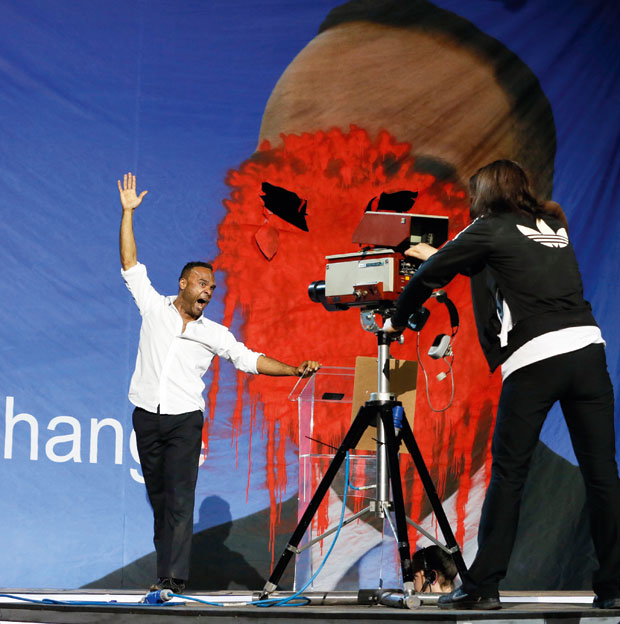Within the space of a few weeks we have had the rare chance of seeing the two great torsos of Russian opera, Borodin’s Prince Igor, unfinished because the composer was often otherwise engaged, and Musorgsky’s Khovanshchina, unfinished because its composer died of drink. Prince Igor at the Coliseum was musically magnificent, and dramatically utterly absurd, ‘self-parody’ that did not do justice to its low-jinks. By contrast, Birmingham Opera Company’s Khovanskygate is musically at least as superb, and dramatically gripping though questionable. As is usual with BOC, the location is unorthodox, in this case an immense tent in the middle of Cannon Hill Park. No seats, except for the disabled, and a lot of being shoved around by members of the chorus or other performers. I’m not sure why we always have to move around so much, but it is a long-established tradition of BOC’s, to make us all feel part of it, I suppose.
The new English version by Max Hoehn was only intermittently intelligible to me, but one more or less takes for granted that Khovanshchina, in any form, is impossible to follow. It seemed that we were being asked — especially since Graham Vick is the director — to draw parallels between the miseries of the Russian people, and the corrupt politicians who rule them, and our own situation. So the TV News that we saw on entering was about fanatical religious groups urging repeal of liberalising laws on gay marriage and abortion, and on female bishops. But how does that fit in with Russian history and politics?
One of the things that makes Khovanshchina a great wreck of a work is that it is specifically about the dreadfulness and possible glory of being Russian. The presupposition of both Musorgsky’s great operas, as of much Russian literature, is that if only some uncorrupt person were in power, Russia would be the place to be, with a hotline to the divine. Religious consciousness, in one form or another, stalks his works. Here it is in the form of the Old Believers, led by the terrifying Dosifei, made all the more frightening by the power and size of Keel Watson, one of BOC’s noblest stalwarts. Another, Paul Nilon, he of the ageless looks and voice, is the Scribbler, a frightful journalist who gets the opera going.
The whole cast is memorable, impressive, whether genuine or bogus reformers, reactionaries, or even — for Musorgsky was shrewd enough to include a kind of love interest — both desperately sexually needy and devout, in the form of Marfa, finely sung by Claudia Huckle. What made the strongest impression of all, though, was the chorus and the City of Birmingham Symphony Orchestra, all united by the astounding efforts of Stuart Stratford. They made the best case I have ever heard for not describing this opera as ‘Sarastro meets Gurnemanz when both are having an off day’, which I believe was Michael Tilson Thomas’s summary, and has all too often seemed accurate. BOC continues to be one of the glories of English cultural life, and I would rather miss any other company’s productions than its.
The Met’s penultimate HD relay was Mozart’s Così fan tutte, conducted by James Levine, now encased in a complicated set of electronic devices that enable him to swivel, and directed by Lesley Koenig. Unusually for the Met, the cast is made up almost entirely of younger and not particularly famous singers, who have no doubt benefited from Levine’s huge experience and wisdom, this opera being one of his favourites. The production lacks distinction, and the sets, by Michael Yeargan, though serviceable don’t reinforce the work’s character. More than in most productions I have seen of this uncomfortable masterpiece, the mood darkens sharply in Act II. Act I I found rather bland, with the two male objects of the experiment returning in such feeble disguises that no one could have mistaken them for a moment — and some grounding in reality is needed, even in this work. And to get my complaints out of the way: Maurizio Muraro’s Don Alfonso was vocally underpowered and dramatically bland, while Danielle de Niese’s Despina was far more irritating than even that character needs to be: even her eyelashes overact, and she seems determined to hog every scene.
However, the marvellous conducting and orchestral playing, and the increasingly beautiful singing of the unfortunate quartet of guinea pigs, made it all told a great experience. In Isabel Leonard we surely have a major artist of the future. Her Dorabella, shy but all too easily aroused, set a new standard in the embodiment of this fragile character. Susanna Phillips’s Fiordiligi was less certain until the climactic duet ‘Fra gli amplessi’, in which she and Matthew Polenzani had me in tears. And Rodion Pogossov was the most satisfyingly embittered Guglielmo, who really looked as if he might kill his faithless fiancée. This was quite the most striking of the Met’s offerings this season.





Comments